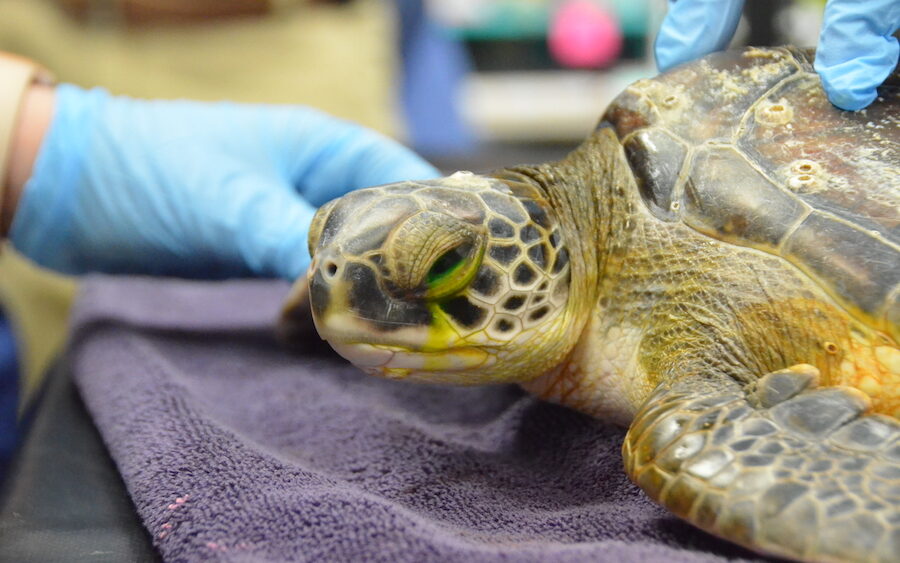Green Sea Turtle (Chelonia mydas)
Stranding Location: Coffin Point, St. Helena, SC
Arrival Date: 2/24/20
Age: Juvenile
Weight: 5.7 lb. (2.6 kg)
Case History
This juvenile green sea turtle was found in the evening at low tide in shallow, muddy water off a residential dock at a creek in Coffin Point. The temperature at the time was in the mid 50’s and the turtle was cold and lethargic. The South Carolina Department of Natural Resources (SCDNR) was contacted, and Keith and Katrina Rossman (area permit holders and SCDNR Transporters) responded to the scene and helped get the turtle to safety overnight. SCDNR staff were able to deliver the turtle to the SCA Sea Turtle Care Center the next morning for assessment and treatment.
Treatment
Sweetgrass did not have any external injuries when found stranded, but appeared to be suffering from cold stunning. The area where the turtle stranded was pretty far up in a creek and the  temperatures of shallow waters drop more drastically with colder weather. Sweetgrass was kept overnight at a steady temperature to allow her to warm up very gradually. After transport and upon arrival at the hospital the next day, the turtle’s temperature was in the low 70’s. With this gradual warming, the turtle’s energy level had also improved. The bloodwork, physical exam and radiographs all appeared to be within relatively normal limits, and Sweetgrass is in pretty good body condition! Sweetgrass was then given fluids for hydration, vitamins, and antibiotics to prevent any complications from the initial cold stress.
temperatures of shallow waters drop more drastically with colder weather. Sweetgrass was kept overnight at a steady temperature to allow her to warm up very gradually. After transport and upon arrival at the hospital the next day, the turtle’s temperature was in the low 70’s. With this gradual warming, the turtle’s energy level had also improved. The bloodwork, physical exam and radiographs all appeared to be within relatively normal limits, and Sweetgrass is in pretty good body condition! Sweetgrass was then given fluids for hydration, vitamins, and antibiotics to prevent any complications from the initial cold stress.
Update
 February 28, 2020: Shortly after receiving treatment, Sweetgrass was tried in a very shallow tank down in our Sea Turtle Hospital. She was alert and swimming well at a low water depth. We will eventually increase the water level as she continues to become more active and stable. Sweetgrass is being offered a piece of fish and a leaf of lettuce daily, and has shown slight interest, but has not eaten yet. It is not unusual for a patient to take a few days before starting to eat. The initial effects of the cold, in addition to the stress of stranding, can affect their appetite for a short period of time. Luckily, Sweetgrass is looking more comfortable in the water every day and has begun to bite at the food!
February 28, 2020: Shortly after receiving treatment, Sweetgrass was tried in a very shallow tank down in our Sea Turtle Hospital. She was alert and swimming well at a low water depth. We will eventually increase the water level as she continues to become more active and stable. Sweetgrass is being offered a piece of fish and a leaf of lettuce daily, and has shown slight interest, but has not eaten yet. It is not unusual for a patient to take a few days before starting to eat. The initial effects of the cold, in addition to the stress of stranding, can affect their appetite for a short period of time. Luckily, Sweetgrass is looking more comfortable in the water every day and has begun to bite at the food!
March 15, 2020: Sweetgrass, like so many of our previous patients, has unfortunately begun to pass several pieces of plastic marine debris, which could explain his lack of interest in food. We are continuing to give him fluids in an effort to keep him hydrated until he starts defecating and eating more regularly. We will continue to offer a few pieces of food daily in hopes to start his metabolism. We are monitoring his fecals closely for any more marine debris.
April 1, 2020: Since our last update, Sweetgrass is no longer passing plastics and has been blowing it up! We know that we talk a lot about how much our patients defecate, but it is an important part of the rehabilitation process, especially when a patient is passing plastics. Sweetgrass has also finished her antibiotic injections and is now swimming in a full tank of water. She has finally warmed up to veggies, though she is extremely picky and spits out her vitamins multiple times when we offer them in her fish.
May 1, 2020: Sweetgrass was pulled for a physical exam this week and she is looking great! We are continuing to give her time for her bloodwork to improve. She is very picky when it comes to her veggies, as she will only eat lettuces, and she is very challenging when it comes to taking her vitamins. She is a pro at spitting them out! Other than that, Sweetgrass’s road to recovery is looking good!


